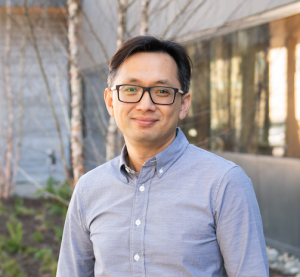Jeffrey Hubbell
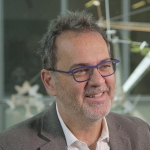 Jeffrey Hubbell is Eugene Bell Professor in Tissue Engineering at the Pritzker School of Molecular Engineering of the University of Chicago. Previous to moving to Chicago, he was on the faculty of the Swiss Federal Institute of Technology Lausanne (EPFL, where he served as Director of the Institute of Bioengineering and Dean of the School of Life Sciences), the Swiss Federal Institute of Technology Zurich and University of Zurich, the California Institute of Technology, and the University of Texas in Austin. He holds a BS from Kansas State University and a PhD from Rice University, both degrees being in chemical engineering. He was elected to the US National Academy of Engineering in 2010, the National Academy of Inventors in 2014, the National Academy of Medicine in 2019, and the American Academy of Arts and Sciences in 2021.
Jeffrey Hubbell is Eugene Bell Professor in Tissue Engineering at the Pritzker School of Molecular Engineering of the University of Chicago. Previous to moving to Chicago, he was on the faculty of the Swiss Federal Institute of Technology Lausanne (EPFL, where he served as Director of the Institute of Bioengineering and Dean of the School of Life Sciences), the Swiss Federal Institute of Technology Zurich and University of Zurich, the California Institute of Technology, and the University of Texas in Austin. He holds a BS from Kansas State University and a PhD from Rice University, both degrees being in chemical engineering. He was elected to the US National Academy of Engineering in 2010, the National Academy of Inventors in 2014, the National Academy of Medicine in 2019, and the American Academy of Arts and Sciences in 2021.
Hubbell uses biomaterials and protein engineering approaches to investigate topics in regenerative medicine and immunotherapeutics. In regenerative medicine, he focuses on biomaterial matrices that mimic the extracellular matrix and on growth factor – extracellular matrix interactions, working in a variety of animal models of regenerative medicine. In immunotherapeutics, he focuses on nanomaterials in vaccines that target lymphoid-resident antigen presenting cells and on protein engineering approaches to deliver antigen to the spleen and liver for inverse vaccines to induce tolerance to protein drugs and in autoimmunity. His interests are both basic and translational, having founded or co-founded six biomedical companies based on his technology, namely Focal, in Boston, acquired by Genzyme; Kuros Biosciences, in Zurich, in the domain of regenerative medicine; Anokion and Kanyos Bio, in Boston, both in the domain of immunological tolerance; Clostra Bio, in Chicago, in the domain of food allergy, founded together in with Prof. Cathryn Nagler at the University of Chicago; Arrow Immune, in the domain of cancer immunotherapy, founded together with Jun Ishihara at Imperial College London and Melody Swartz at the University of Chicago; and HeioThera, in the domain of autoimmunity and inflammation, founded together with Jun Ishihara at Imperial College London.
- Aslan Mansurov1, Seounghun Kang1, Jun Ishihara2, and Jeffrey A Hubbell1
- 1Pritkzer School of Molecular Engineering, University of Chicago, Chicago, United States
- 2Department of Bioengineering, Imperial College London, London, United Kingdom
- Disclosure of Interest: A. Mansurov, J.A. Hubbell and J. Ishihara are shareholders of Arrow Immune, Inc.
Michelle Yen
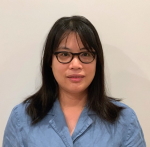 Michelle is a Senior Scientist in Protein Engineering at Flagship Labs 91, an early stage biotech originated by Flagship Pioneering. There, she works to systematically rewire cell signaling for health in the autoimmunity and immuno-oncology space. Prior to Flagship, Michelle completed a postdoc with Chris Garcia at Stanford, where she developed a platform to systematically discover antibody-based cytokine mimetics with diversified functional properties. Michelle identified mechanisms of calcium channel gating and activation during her PhD under the mentorship of Rich Lewis at Stanford.
Michelle is a Senior Scientist in Protein Engineering at Flagship Labs 91, an early stage biotech originated by Flagship Pioneering. There, she works to systematically rewire cell signaling for health in the autoimmunity and immuno-oncology space. Prior to Flagship, Michelle completed a postdoc with Chris Garcia at Stanford, where she developed a platform to systematically discover antibody-based cytokine mimetics with diversified functional properties. Michelle identified mechanisms of calcium channel gating and activation during her PhD under the mentorship of Rich Lewis at Stanford.
Nathaniel West
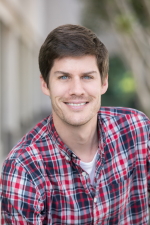 Nathan West conducted his doctoral research at the British Columbia Cancer Agency and University of Victoria (Canada), where he studied the impact of inflammatory cytokines on breast cancer progression, and the clinical relationship between anti-tumor immune responses and chemotherapy efficacy. In 2012, Nathan moved to the University of Oxford (United Kingdom) for his post-doctoral training, where he characterized novel genetic and cytokine drivers of inflammatory bowel disease and colorectal cancer. In 2017, Nathan became a lab head in the Cancer Immunology Department at Genentech (USA). His group continues to explore the complex roles of cytokines in cancer and inflammatory diseases, and how cytokine signaling pathways can be leveraged for the development of novel therapies.
Nathan West conducted his doctoral research at the British Columbia Cancer Agency and University of Victoria (Canada), where he studied the impact of inflammatory cytokines on breast cancer progression, and the clinical relationship between anti-tumor immune responses and chemotherapy efficacy. In 2012, Nathan moved to the University of Oxford (United Kingdom) for his post-doctoral training, where he characterized novel genetic and cytokine drivers of inflammatory bowel disease and colorectal cancer. In 2017, Nathan became a lab head in the Cancer Immunology Department at Genentech (USA). His group continues to explore the complex roles of cytokines in cancer and inflammatory diseases, and how cytokine signaling pathways can be leveraged for the development of novel therapies.
Jamie Spangler
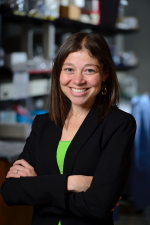 Dr. Jamie Spangler earned a Bachelor of Science degree in Biomedical Engineering at Johns Hopkins University and went on to conduct her Ph.D. research in Biological Engineering in Professor K. Dane Wittrup’s group at MIT, studying antibody-mediated down-regulation of epidermal growth factor receptor as a new mechanism for cancer therapy. She then completed a postdoctoral fellowship in Professor K. Christopher Garcia’s lab in the Molecular & Cellular Physiology and Structural Biology departments at Stanford University School of Medicine, focusing on engineering cytokine systems to bias immune homeostasis. Dr. Spangler launched her independent research group at Johns Hopkins University in July 2017, jointly between the departments of Biomedical Engineering and Chemical & Biomolecular Engineering. Her lab, located in the Translational Tissue Engineering Center at the School of Medicine, applies structural and mechanistic insights to re-engineer existing proteins and design new proteins that therapeutically modulate the immune response. In particular, her group is interested in engineering immune molecules such as cytokines, growth factors, and antibodies for targeted treatment of diseases such as cancer and autoimmune disorders. Dr. Spangler’s work has been recognized with several awards, including a V Foundation Scholar Award, an Emerson Collective Cancer Research Award, a Sanofi iAward, an E. Matilda Ziegler Foundation for the Blind Award, a Melanoma Research Alliance Young Investigator Award, a Damon Runyon-Rachleff Innovation Award, and an NSF CAREER award. She was selected to deliver the 2020 Young Scientist Keynote at the Protein Engineering Summit and she was named the 2022 Maryland Outstanding Young Engineer.
Dr. Jamie Spangler earned a Bachelor of Science degree in Biomedical Engineering at Johns Hopkins University and went on to conduct her Ph.D. research in Biological Engineering in Professor K. Dane Wittrup’s group at MIT, studying antibody-mediated down-regulation of epidermal growth factor receptor as a new mechanism for cancer therapy. She then completed a postdoctoral fellowship in Professor K. Christopher Garcia’s lab in the Molecular & Cellular Physiology and Structural Biology departments at Stanford University School of Medicine, focusing on engineering cytokine systems to bias immune homeostasis. Dr. Spangler launched her independent research group at Johns Hopkins University in July 2017, jointly between the departments of Biomedical Engineering and Chemical & Biomolecular Engineering. Her lab, located in the Translational Tissue Engineering Center at the School of Medicine, applies structural and mechanistic insights to re-engineer existing proteins and design new proteins that therapeutically modulate the immune response. In particular, her group is interested in engineering immune molecules such as cytokines, growth factors, and antibodies for targeted treatment of diseases such as cancer and autoimmune disorders. Dr. Spangler’s work has been recognized with several awards, including a V Foundation Scholar Award, an Emerson Collective Cancer Research Award, a Sanofi iAward, an E. Matilda Ziegler Foundation for the Blind Award, a Melanoma Research Alliance Young Investigator Award, a Damon Runyon-Rachleff Innovation Award, and an NSF CAREER award. She was selected to deliver the 2020 Young Scientist Keynote at the Protein Engineering Summit and she was named the 2022 Maryland Outstanding Young Engineer.
Andy Yeung
Andy Yeung currently serves as the Chief Technology Officer of Asher Biotherapeutics, which was co-founded by Andy in 2019. At Asher Bio, Andy is responsible for the engineering and development of antibody and cytokine candidates. Previously Andy spent ten years at Pfizer, most recently holding the title of Director of Biotherapeutic Design and Discovery. At Pfizer, Andy led protein engineering efforts for various programs including CD3 bispecific, CAR-T, and immuno-oncology (antibodies and cytokines). Prior to Pfizer, Andy was a post-doctoral fellow in the Antibody Engineering Department at Genentech. Andy received his Ph.D. in Chemical engineering and M.S. in Chemical Engineering Practice from Massachusetts Institute of Technology, and a B.Sc. in Chemical Engineering from University of Wisconsin-Madison.
Hosts
Katherine Harris
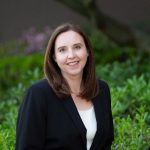 Katherine Harris is Vice President of Discovery at Amgen where she leads Oncology Research at the Amgen Newark site, pursuing novel multi-specific molecules to modulate the anti-tumor immune response. Previously she served as Vice President of Discovery at Teneobio where she led the Discovery and Lead Optimization team in the development of multi-specific therapeutic antibodies. She joined Teneobio when the company started lab operations in 2015, playing a key role in the strategic direction of the company as well as building and managing a high-throughput antibody discovery platform. Prior to Teneobio, she worked at Active Motif and SwitchGear Genomics where she focused her efforts on developing a functional genomics platform for small molecule screening. Dr. Harris holds a Ph.D. in Molecular and Cell Biology from the University of California, Berkeley.
Katherine Harris is Vice President of Discovery at Amgen where she leads Oncology Research at the Amgen Newark site, pursuing novel multi-specific molecules to modulate the anti-tumor immune response. Previously she served as Vice President of Discovery at Teneobio where she led the Discovery and Lead Optimization team in the development of multi-specific therapeutic antibodies. She joined Teneobio when the company started lab operations in 2015, playing a key role in the strategic direction of the company as well as building and managing a high-throughput antibody discovery platform. Prior to Teneobio, she worked at Active Motif and SwitchGear Genomics where she focused her efforts on developing a functional genomics platform for small molecule screening. Dr. Harris holds a Ph.D. in Molecular and Cell Biology from the University of California, Berkeley.
Jonathan Sockolosky
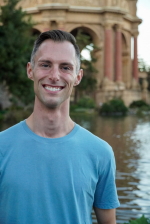 Jonathan Sockolosky is currently the Director of Company Value Creation for Curie.Bio, a founder-centric, seed stage biotechnology investing firm that reduces the barrier for founders to build new therapeutic companies and foster innovation. Previously Jonathan served as a Senior Scientist in the Department of Antibody Engineering at Genentech. His research group focused on the development of next generation immune modulating therapeutics for oncology and cancer immunology, with a focus on cytokine biology and engineering. Prior to Genentech, Jonathan was a Principal Scientist at ALX Oncology, a clinical stage biotechnology company developing CD47/SIRPa antagonists for cancer immunotherapy. Jonathan received his BS/MS in Biomedical Engineering from the University of Michigan, his PhD in Pharmaceutical Sciences from UCSF, and did postdoctoral research at Stanford in the lab of K. Christopher Garcia where he invented orthogonal IL-2 cytokine-receptor pairs for cell therapy under development by Synthekine.
Jonathan Sockolosky is currently the Director of Company Value Creation for Curie.Bio, a founder-centric, seed stage biotechnology investing firm that reduces the barrier for founders to build new therapeutic companies and foster innovation. Previously Jonathan served as a Senior Scientist in the Department of Antibody Engineering at Genentech. His research group focused on the development of next generation immune modulating therapeutics for oncology and cancer immunology, with a focus on cytokine biology and engineering. Prior to Genentech, Jonathan was a Principal Scientist at ALX Oncology, a clinical stage biotechnology company developing CD47/SIRPa antagonists for cancer immunotherapy. Jonathan received his BS/MS in Biomedical Engineering from the University of Michigan, his PhD in Pharmaceutical Sciences from UCSF, and did postdoctoral research at Stanford in the lab of K. Christopher Garcia where he invented orthogonal IL-2 cytokine-receptor pairs for cell therapy under development by Synthekine.

